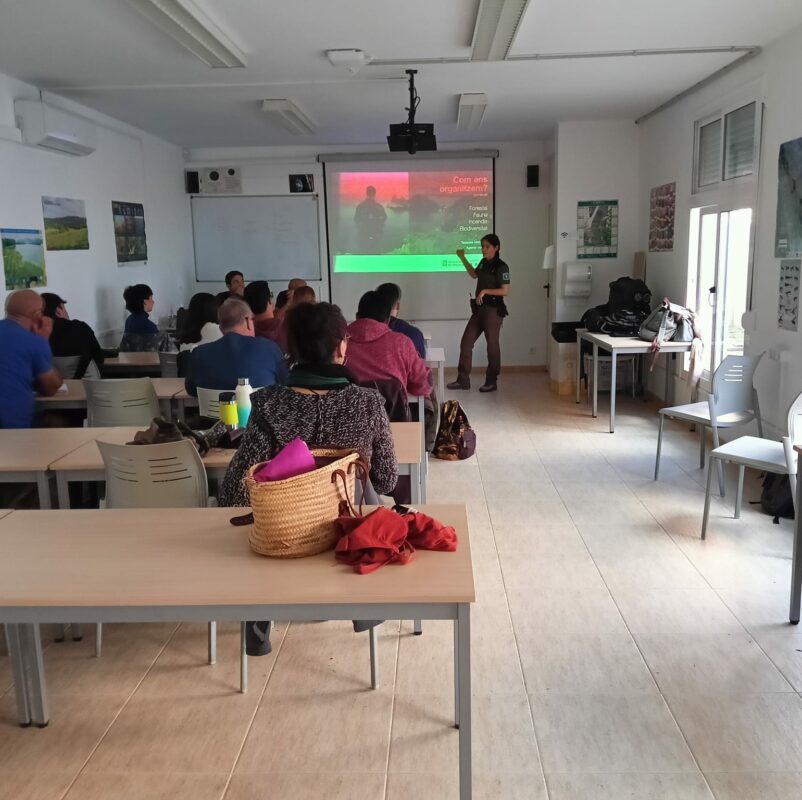Registrations are open for the second edition of the course for environmental informers that will be held in Tremp and Amposta in spring 2025 with the aim of promoting more respectful and compatible visits with the conservation of biodiversity.
The creation of jobs in natural areas will contribute to facing the demographic challenge of some rural areas.
After the success of the first edition of the environmental informers’ course in Santa Coloma de Farners, the Flow4Bio project is preparing a second edition of the course to be carried out in Amposta and Tremp during the spring of 2025. Framed within the Flow4Bio project – led by Emys Foundation with the participation of the Center for Forest Science and Technology of Catalonia (CTFC), Trenca Foundation and SEO/BirdLife –, this training aims to provide participants with the necessary tools to welcome visitors to natural areas and promote a respectful visit.
The first edition of the course for environmental informers organized by the Emys Foundation in the framework of the Flow4Bio project at the Forestry School of Santa Coloma de Farners, has sold out with a total of 15 participants. The course, which began last September 21, ends this Sunday with an outing to the Montseny Natural Park.
Alba Segura, trainer of the current edition and project technician at the Emys Foundation, explains that the figure of the environmental informer is essential for the protection and preservation of the natural environment. With increasing pressure on ecosystems due to climate change and tourism overcrowding, the management entities of many natural areas increasingly see the need to train environmental informants to greet visitors. The task of the environmental informants is to provide information to visitors on how to visit natural environments with a minimal impact, Segura points out. She adds that they are also responsible for collecting data, which helps to determine the impacts suffered by the area, such as whether there are too many visitors or too many vehicles.
The course consists of 80 hours of training and includes specialized modules on natural heritage interpretation, environmental awareness and communication, natural space regulations, and entrepreneurship. These contents are taught on a hibrid learning basis on weekends and include field trips to put knowledge into practice in the field.
“It is an extremely complete training that fits very well with the complexity of the figure of the environmental informant,” explains Eloi Iglesias Navarrete, a student of the course who had already worked as an informant. Iglesias also stresses that it is a suitable course for anyone who wants to enter this world, since it provides very useful information and tools for the resolution of various situations that informants may encounter in their day-to-day work.
Benefits for nature and the local economy
“Green occupation in natural spaces contributes to face the demographic challenge in rural areas, which often suffer from depopulation risk and lack of economic resources,” points out Cristina Sánchez, delegate of SEO/BirdLife in Catalonia, one of the partners of the Flow4Bio project. “In addition to ecological benefits, the creation of jobs linked to environmental conservation boosts the local economy and favors the preservation of natural and cultural heritage,” she adds.
The first edition of this course has sold out for its autumn edition in Santa Coloma de Farners. Even so, a second edition of the course is already being prepared, which will be taught during the spring of 2025 and can be taken in Tremp or Amposta.
The Flow4Bio, Flowing Forests for Biodiversity and People project is supported by the Biodiversity Foundation of the Ministry for Ecological Transition and Demographic Change (MITECO) in the framework of the Recovery, Transformation and Resilience Plan (PRTR), funded by the European Union – NextGenerationEU.
More information: https://www.fundacioemys.org/can/arees-y-proyectos/os-public/curso-d-informadores-ambientales/

Last modified: 4 November 2025










